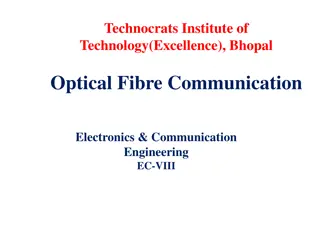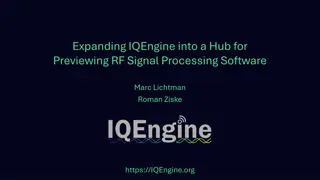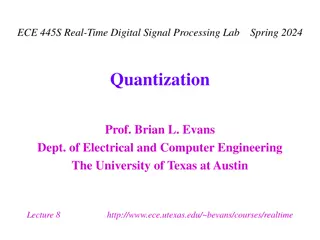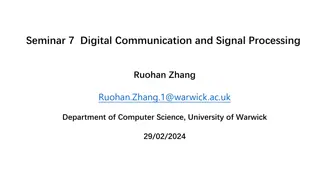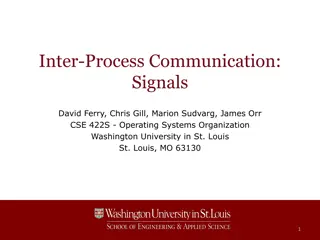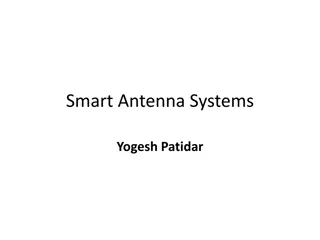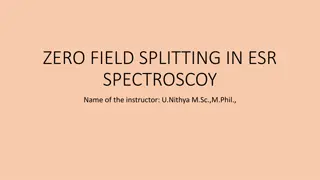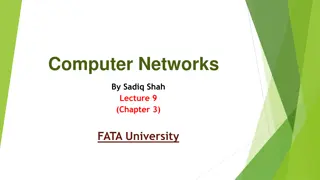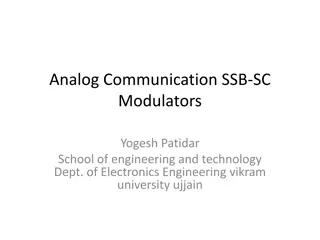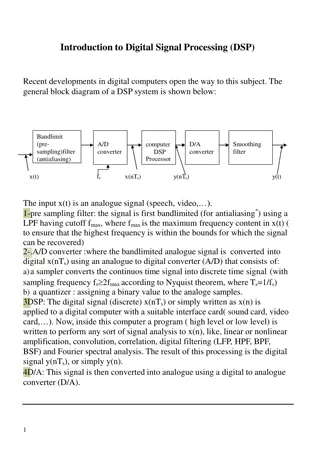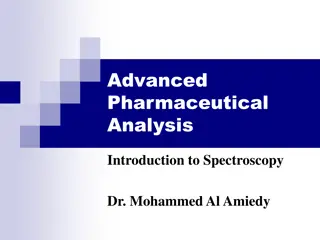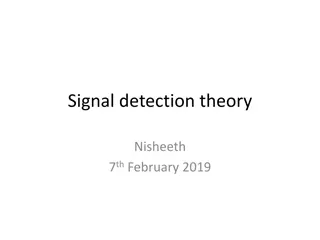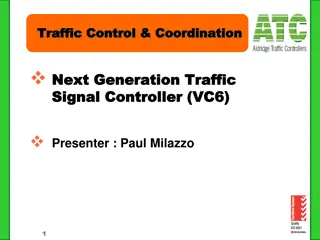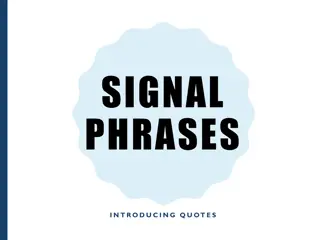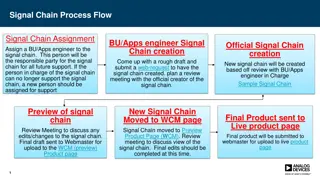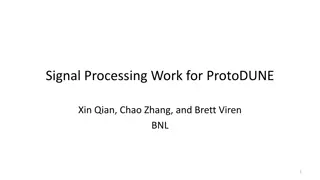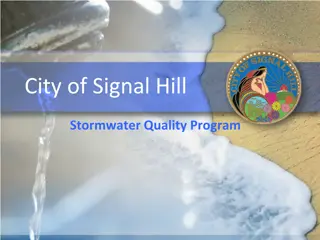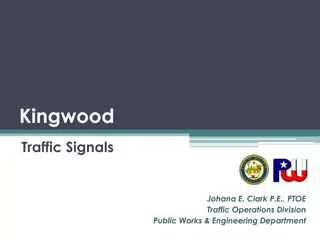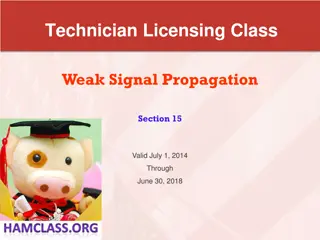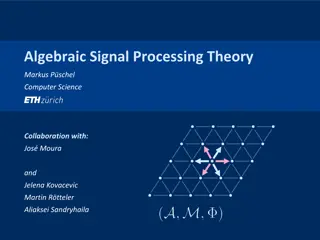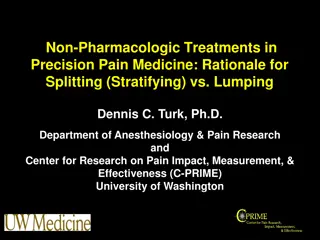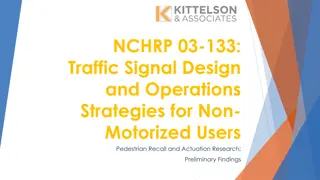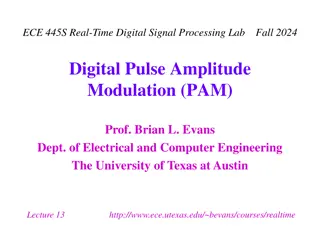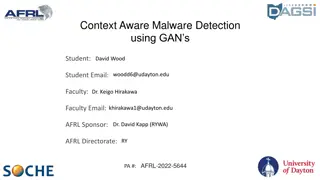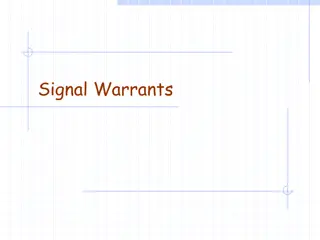Understanding Data Acquisition and Instrument Interface
In the realm of data acquisition and instrument interface, various components come together to sense physical variables, condition electrical signals, convert analog to digital data, and analyze the acquired information. This process involves transducers, signal analysis, instrument automation, and
3 views • 54 slides
Understanding Interpolation and Pulse Shaping in Real-Time Digital Signal Processing
Discrete-to-continuous conversion, interpolation, pulse shaping techniques, and data conversion in real-time digital signal processing are discussed in this content. Topics include types of pulse shapes, sampling, continuous signal approximation, interpolation methods, and data conversion processes
4 views • 14 slides
Understanding Hyperfine Interactions in Atomic Physics
Hyperfine interactions play a crucial role in atomic physics, leading to small energy shifts and splitting of degenerate levels in atoms and molecules. These interactions involve the electromagnetic multipole interactions between the nucleus and electron clouds, resulting in the splitting of energy
13 views • 154 slides
Understanding Optical Fiber Signal Degradation in Communication Engineering
Technocrats Institute of Technology (Excellence) in Bhopal delves into the concepts of signal degradation in optical fiber communication, focusing on attenuation, distortion mechanisms, and measurement techniques. The institute emphasizes the importance of signal attenuation and its impact on inform
4 views • 56 slides
Expanding IQEngine: A Hub for Previewing RF Signal Processing Software
IQEngine is evolving into a versatile hub where users can manage, analyze, process, and share RF signal recordings directly in their browser. Built on an open standard, IQEngine stores data such as sample rate, center frequency, and IQ data type to prevent data degradation. Frontend powered by React
7 views • 22 slides
Real-Time Digital Signal Processing Lab: Quantization and Resolution Overview
Explore quantization and resolution techniques in real-time digital signal processing. Topics include quantization error analysis, total harmonic distortion, noise immunity in communication systems, human sensory resolution, analog-to-digital conversion, and uniform amplitude quantization. Dive into
7 views • 19 slides
Pascal's Rule in NMR Spectroscopy ( n+1 )
Pascal's Rule in NMR spectroscopy, also known as the (N+1) rule, is an empirical rule used to predict the multiplicity and splitting pattern of peaks in 1H and 13C NMR spectra. It states that if a nucleus is coupled to N number of equivalent nuclei, the multiplicity of the peak is N+1. The rule help
1 views • 30 slides
Seminar 7 Digital Communication and Signal Processing
Learn how to design a second order ARMA filter to suppress sinusoidal disturbances in a signal while preserving the original signal. The process involves deriving the transfer function, determining coefficients, and sketching a block diagram representation of the filter.
0 views • 7 slides
Understanding Stark Effect in Quantum Mechanics: A Comprehensive Overview
Stark Effect is the splitting of spectral lines in the presence of an external electric field, named after physicist J. Stark. This phenomenon can be observed in linear and quadratic forms, influencing energy levels in atoms. The interaction energy and splitting of energy levels are essential aspect
1 views • 9 slides
Understanding Crystal Field Theory in Chemistry
Crystal Field Theory (CFT) explains how electron orbital degeneracies, particularly d or f orbitals, are affected by a static electric field generated by neighboring anions. In CFT, the metal ion is considered positive while ligands are negative charges, leading to attractive and repulsive forces af
0 views • 13 slides
Understanding Inter-Process Communication Signals in Operating Systems
Signals in inter-process communication are asynchronous notifications delivered to specific processes, allowing event-based programming. Processes can handle signal delivery by ignoring it, terminating, or invoking a signal handler. Signal handlers can be written in two ways - one handler for many s
0 views • 21 slides
Smart Antenna Systems Overview: Enhancing Wireless Performance
Smart antenna systems, like adaptive array antennas and switched beam antennas, combine antenna arrays with digital signal processing to transmit and receive signals adaptively. These systems improve signal quality, reduce interference, and increase capacity by dynamically adjusting radiation patter
0 views • 20 slides
Understanding Zero Field Splitting in ESR Spectroscopy
Zero field splitting in ESR spectroscopy involves the relaxation times in ESR and how spin-lattice relaxation affects the spectral width. Discover how T1 value and spin lattice relaxation play a crucial role in observing sharp spectrum lines in EPR. Learn about line widths in ESR, spin dilution, and
0 views • 21 slides
Understanding Transmission Impairments in Computer Networks
Signals traveling through transmission media in computer networks can experience attenuation, distortion, and noise, leading to signal loss and changes in form or shape. Attenuation results in energy loss requiring amplification, while distortion alters the signal's composition. Engineers use decibe
1 views • 12 slides
Understanding SSB-SC Modulation in Analog Communication
Single Sideband Suppressed Carrier (SSB-SC) modulation is a technique in analog communication that transmits a single sideband along with the carrier signal, offering advantages such as reduced bandwidth consumption, increased signal transmission capacity, and lower noise interference. However, the
0 views • 9 slides
Overview of Digital Signal Processing (DSP) Systems and Implementations
Recent advancements in digital computers have paved the way for Digital Signal Processing (DSP). The DSP system involves bandlimiting, A/D conversion, DSP processing, D/A conversion, and smoothing filtering. This system enables the conversion of analog signals to digital, processing using digital co
1 views • 24 slides
Spectroscopy and Pattern Recognition in Pharmaceutical Analysis
Understanding spectroscopy and pattern recognition in pharmaceutical analysis is crucial for interpreting 1H NMR spectra. Specific splitting patterns indicate the presence of various functional groups like ethyl, isopropyl, and tert-butyl. Recognizing these patterns aids in identifying compounds eff
3 views • 51 slides
Understanding Signal Detection Theory in Psychophysics
Signal Detection Theory in psychophysics quantifies how observers respond to signals in noise. It involves mathematical models like psychometric functions to measure bias and sensitivity in detecting stimuli. Key concepts include sensitivity and criterion in distinguishing signal perception and repo
6 views • 24 slides
Traffic Control and Coordination: Next Generation Signal Controller Overview
Explore the evolution of traffic signal controllers in Australia, from VC5 to VC6, along with the software integration and system overview. Learn about the hardware configurations and capabilities of the latest TSC/4 controllers, including signal group monitoring and conflict capabilities. The new g
4 views • 10 slides
Mastering the Art of Introducing Quotes with Signal Phrases
Understanding the importance of signal phrases in academic writing. Signal phrases provide context, establish credibility of sources, and prevent dropped quotes. Learn the key elements required for an effective signal phrase and how to structure them using different formulas. Enhance your writing by
1 views • 16 slides
Developing and Managing Signal Chains for Future Support
Create a system to assign a responsible person for signal chains, initiate the chain creation process, review and finalize the signal chain, and move it to the live product page. Guidelines include color codes for blocks, assigning part numbers to each block, and adding images to the signal chain.
1 views • 4 slides
Advancements in Signal Processing for ProtoDUNE Experiment
The team, including Xin Qian, Chao Zhang, and Brett Viren from BNL, leverages past experience in MicroBooNE to outline a comprehensive work plan for signal processing in ProtoDUNE. Their focus includes managing excess noise, addressing non-functional channels, and evolving signal processing techniqu
1 views • 23 slides
Comprehensive Training Package on Active Tuberculosis Drug Safety Monitoring and Management (aDSM) 2023
This training package focuses on signal detection in active tuberculosis drug safety monitoring. It covers the main aims and principles of signal detection, completion of safety profiles for new TB drugs and regimens, definition of signal, continuous reporting activities, construction of risk profil
5 views • 15 slides
City of Signal Hill Stormwater Quality Program Overview
The City of Signal Hill, known for its unique geographic characteristics and historical oil production legacy, is proactive in implementing stormwater quality programs. The city addresses MS4 and TMDL requirements, demonstrating regional leadership in environmental initiatives. With a population of
1 views • 42 slides
Kingwood Traffic Signals Overview and Updates
Traffic operations in Kingwood, managed by Johana E. Clark, P.E., include signal system improvements and updates. Recent changes involve signal removal studies, new signal installations, and upgrades at key intersections to enhance traffic flow and safety. The system's capacity and daily traffic vol
1 views • 11 slides
Understanding Weak Signal Propagation in Radio Waves
This informative content delves into weak signal propagation and its various aspects related to electromagnetic waves, particularly in the context of radio communication. It covers topics such as radio waves, radio horizon, knife-edge diffraction, tropospheric scatter mode, auroral reflection, and m
1 views • 37 slides
Carnegie Mellon Algebraic Signal Processing Theory Overview
Carnegie Mellon University is at the forefront of Algebraic Signal Processing Theory, focusing on linear signal processing in the discrete domain. Their research covers concepts such as z-transform, C-transform, Fourier transform, and various signal models and filters. The key concept lies in the al
2 views • 40 slides
Numerical Solution of Eulerian Advection Equation in 1-D Operator Splitting
Application of operator splitting over three directions allows reducing the Eulerian advection equation to 1-D, enabling finite differencing of derivatives while maintaining conservation properties. Various numerical schemes like forward Euler, leapfrog, and linear upstream are discussed, highlighti
0 views • 8 slides
Non-Pharmacologic Treatments in Precision Pain Medicine: Splitting vs. Lumping Criteria
This article discusses the rationale behind splitting (stratifying) versus lumping patients in precision pain medicine. It explores criteria for stratifying patients based on demographic, genetics, biomedical mechanisms, clinical presentation, etiological factors, and psychological response to treat
0 views • 35 slides
Advanced Parcel Editing Techniques in ArcGIS
Explore the various tools and functionalities available within ArcGIS for cutting out parcels within a county database without relying on third-party software. Learn about options such as the Cogo Toolbar, Parcel Editor, and Parcel Fabric Toolbar, each offering unique capabilities like parcel splitt
0 views • 19 slides
THVD8000 Line Driver for AC Line PLC Bench Setup
Explore the setup of THVD8000 line driver for AC line PLC, including transmitting and receiving paths, signal flow, power distribution, and components involved. Follow the signal path from THVD8000EVM to AFE031 boostpack, transformer, HV capacitor, and UCC28880EVM. Understand the power flow from AC
0 views • 11 slides
Data Selection for Signal Variables and Efficiency Optimization
Utilizing a Boosted Decision Tree (BDT) method, this presentation discusses the selection of signal input variables for Xic particles, maximizing the S/sqrt(S+B) ratio for signal efficiency in particle physics analysis. The process involves using real data as input variables, cutting variables to im
0 views • 6 slides
Understanding Relationships Among Ideas: Signal Words and Grammar
Discover the importance of signal words and grammar in expressing relationships among ideas through conjunctions, transitions, and prepositions. Learn about different categories of signal words such as addition, cause/result, condition, time, sequence, contrast, and comparison. Understand the nuance
0 views • 10 slides
Centre of Excellence in Signal Processing Activities and Progress Report
Broad areas of signal processing activities at the Centre of Excellence in Signal Processing include audio, speech, language, medical image processing, computer vision, wireless communications, and machine learning. The center focuses on addressing various challenges in audio/speech recognition, emo
0 views • 17 slides
Enhancing Traffic Signal Design for Pedestrian Safety
The research focuses on developing strategies to improve traffic signal functionality for pedestrians and cyclists. It explores the impact of pedestrian recall and actuation on traffic operations and safety, investigating factors such as pedestrian volume thresholds. Using microsimulation models on
0 views • 13 slides
Real-Time Digital Signal Processing Lab: Digital Pulse Amplitude Modulation (PAM)
Introduction to Digital Pulse Amplitude Modulation (PAM) in the context of Real-Time Digital Signal Processing Lab. Topics covered include pulse shaping, symbol mapping, baseband PAM transmission, and more. The content delves into bit-to-symbol conversion, symbol amplitude mapping, symbol period det
0 views • 18 slides
Context-Aware Malware Detection Using GANs in Signal Systems
This project focuses on detecting malware within signal/sensor systems using a Generative Adversarial Network (GAN) approach. By training on normal system behavior and generating fake malware-like samples, the system can effectively identify anomalies without relying on signature-based methods. The
0 views • 10 slides
Understanding Traffic Signal Warrants and Timing Relationships
Explore the world of traffic signal warrants, basic terminology, and timing relationships with detailed visuals and explanations. Learn about lost time, green indications, effective green time, and flow terminology. Discover concepts like the Change/Clearance Interval and the Dilemma Zone in traffic
0 views • 17 slides
Understanding Inter-Process Communication Signals in Operating Systems
Signals in operating systems play a critical role in facilitating asynchronous notifications between processes. They allow for event-based programming and are conceptually similar to hardware interrupts and exceptions. Processes can handle signal delivery by ignoring it, terminating, or invoking a s
0 views • 24 slides
Understanding Fast Fourier Transform (FFT) in Signal Processing
Fast Fourier Transform (FFT) is a powerful algorithm used in signal processing to efficiently calculate the Discrete Fourier Transform (DFT). This advanced technique leverages symmetry and periodicity properties to reduce computational complexity, making it a key tool in digital signal analysis. By
0 views • 14 slides



